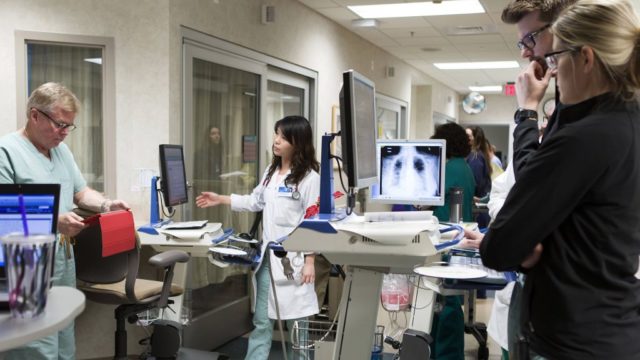
Some of the most common complications from severe COVID-19 include respiratory problems like pneumonia, hypoxemic respiratory failure and acute respiratory distress syndrome (ARDS).
Dr. Daniel Brown, director of critical care medicine at Mayo Clinic, says these patients with severe illness may require a higher level of care and often are brought into an ICU for breathing support.
“We’re using all of our modalities for respiratory support. That includes everything from nasal cannula oxygen all the way up to mechanical ventilation and ECMO, or extracorporeal membrane oxygenation. So, the full gamut of respiratory support, much like we would see in other forms of viral pneumonia.”
“These patients are sedated to the degree that is required for them to tolerate mechanical ventilation. One of the concerns with lung injury is that the body is going to attempt to maintain appropriate oxygenation and ventilation. So a patient will breathe quite hard and that can be actually damaging to the lungs.”
“We attempt to provide mechanical ventilatory assistance when needed; place a breathing tube, and then sedate the patient, again, to the degree that they are required to tolerate the mechanical ventilation,” Dr. Brown says. “Sometimes we actually have to pharmacologically paralyze patients such that they don’t behave in a manner of taking very large breaths that we know cause damage to the lungs. So, this is all accompanied with the appropriate level of sedation, and the staff that provide care to these patients are all well-trained in this assessment and management.”
The length of time on a ventilator can vary, says Dr. Brown. “This degree of respiratory illness is a bit longer in terms of mechanical ventilation than we often associate with a pneumonia. These patients are intubated for days, more than a week at times. And as they begin to resolve their illness, they begin to breathe on their own and we allow that. When they are breathing sufficiently on their own and they have adequate oxygenation, the breathing tube comes out.”
There are no FDA-approved drugs to treat or prevent COVID-19 at this time. Those hospitalized with COVID-19 are given supportive care to help with their complications and symptoms and may be offered investigational drugs or therapies.
Researchers are testing convalescent plasma therapy as a treatment for people with COVID-19.
Emergency signs or symptoms of COVID-19 include (but not exclusively)
- Trouble breathing
- Persistent pain or pressure in the chest
- New confusion or inability to arouse
- Bluish lips or face
Call 9-1-1 if you or a family member develop these symptoms. Notify the emergency operator that you have or think you might have COVID-19. If possible, put on a face mask before medical help arrives
‘Courtesy: Daniel Brown, M.D. / Critical Care/ Mayo Clinic.’[/vc_message]
Disclaimer
The information contained in South Florida Reporter is for general information purposes only.
The South Florida Reporter assumes no responsibility for errors or omissions in the contents of the Service.
In no event shall the South Florida Reporter be liable for any special, direct, indirect, consequential, or incidental damages or any damages whatsoever, whether in an action of contract, negligence or other tort, arising out of or in connection with the use of the Service or the contents of the Service.
The Company reserves the right to make additions, deletions, or modifications to the contents of the Service at any time without prior notice.
The Company does not warrant that the Service is free of viruses or other harmful components












